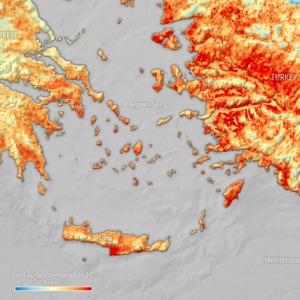Actualizado el 25/03/2025
Mediterranean continues to bakeEscrito por Redacción TNI el 11/08/2021 a las 11:38:591281
 This map shows the temperature of the land surface on 2 August 2021. It is clear to see that surface temperatures in Turkey and Cyprus have reached over 50°C, again. A map we published on 2 July shows pretty much the same situation. The Mediterranean has been suffering a heatwave for some weeks, leading to numerous wildfires. Turkey, for example, is reported to be amid the country’s worst blazes in at least a decade.
The map here was generated using data from Copernicus Sentinel-3’s Sea and Land Surface Temperature Radiometer. While weather forecasts use predicted air temperatures, this satellite instrument measures the real amount of energy radiating from Earth – and dipicts the real temperature of the land surface. The Copernicus Sentinel-3 satellites also carry camera-like instruments, which captured smoke billowing from the fires in Turkey on 30 July.
About the European Space Agency
The European Space Agency (ESA) provides Europe’s gateway to space.
ESA is an intergovernmental organisation, created in 1975, with the mission to shape the development of Europe’s space capability and ensure that investment in space delivers benefits to the citizens of Europe and the world. ESA has 22 Member States: Austria, Belgium, the Czech Republic, Denmark, Estonia, Finland, France, Germany, Greece, Hungary, Ireland, Italy, Luxembourg, the Netherlands, Norway, Poland, Portugal, Romania, Spain, Sweden, Switzerland and the United Kingdom. Slovenia, Latvia and Lithuania are Associate Members.
ESA has established formal cooperation with five Member States of the EU. Canada takes part in some ESA programmes under a Cooperation Agreement. By coordinating the financial and intellectual resources of its members, ESA can undertake programmes and activities far beyond the scope of any single European country. It is working in particular with the EU on implementing the Galileo and Copernicus programmes as well as with Eumetsat for the development of meteorological missions. Learn more about ESA at www.esa.int |